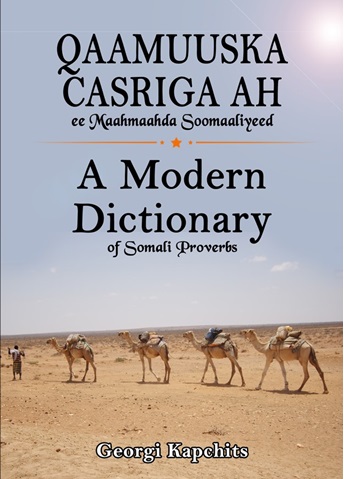By Adan Makina
I’ve heard many times, the brain-teasing Somali saying: “Am I crazy or there’s a music delirium going on in Aden?” However, “I have never heard nor seen anything like what my octogenarian Russian-born friend and poet who contacted me on Sunday (October 11, 2020) revealed to me. He broke to me the news that “A Modern Dictionary of Somali Proverbs” that he had been working on for many years has been published. The book is not written in his mother tongue which is Russian, but, in the ancient Somali language which is known as Somali.

The Dictionary contains 5,000 proverbs. Although it has been said in the past that “Somalis do not lie in their proverbial expressions”, the author, Dr. Georgi Kapchits, deserves to be publicized so that those who have never heard about him may understand his biography by being placed on a pedestal as a form of pioneering his unreserved commitment to the cause of the Somali language that is on the brink of diminishing or at the brink of extinction in the absence of linguistics research, advocacy and awareness, arts and cultural revitalizations, language education, media application, and the provision of language materials.
With over 6,000 languages spoken in the world today, about eight of them could disappear sooner or later. They include the Irish Gaelic having 40,000 surviving elderly speakers who were born in the 1930s, Krymchak that is Judeo-Crimean Tatar with a mere 200 speakers as per a 2007 research, the Okanagan-Colville with 150 speakers mainly in British Columbia, Canada, Ts’ixa of Botswana with 200 native speakers, Ainu of Japan, Rapa Nui of Easter Islands with 3390 speakers as per 2000 research, the Yagan of Chile with only one surviving indigenous speaker, and finally the Saami of Norway, Sweden, Russia and Finland who are commonly referred to as the Lappish languages.[1] Since we haven’t heard from a foreign speaker of the Somali language for some time and that Georgi Kapchits appears to be the number one towering figure above the rest who strenuously took several years to bring a document worth celebrating, he deserves a pat on the back and a traditional welcoming ceremony as a show of respect for the tremendous work he did for the Somali language and its speakers, who, apart from a few, left it to its own perdition despite the Somali language resembling the ancient Egyptian Hieroglyphics. After personal salutations and after giving him the respect he deserves, allow me to move ahead with what the topic embraces.

Before I delve into the content of “A Modern Dictionary of Somali Proverbs”, I would like to share with you the history of Georgi Kapchits, an author who appears in one of my articles that is yet to be posted. In that article, I expounded the important role he played in the development of the Somali language. My mentioning of Georgi’s name in my upcoming article seemed to me to have been a coincidence. That shows, I had him in mind when he suddenly contacted me by way of electronic communication. Georgi, who calls me “Dear Adam” or “My Younger Brother” when exchanging e-mails, means a lot to me. We have known each other for more than 10 years and the benefits I gained from him cannot be estimated. There is a foreign language saying “lean on the shoulders of giants” which means surround yourself with those endowed with knowledge. I have Georgi because he is a giant all Somalis can lean on.
A Brief Biography of Georgi Kapchits
Georgi is a fluent Amharic and Somali scholar who was born in the vast Soviet Union in 1939 – at the beginning of World War II. In 1967 he graduated from Lomonosov University in Москва, Moscow. Georgi should not be surprised by my use of Moskva because it has been in mind since I was a child. Lomonosov University was founded in 1755, twenty-one years before US Independence – by Mikhail Lomonosov, a Russian scientist of encyclopedic mind during the enlightenment era. “Alexander Pushkin described him as a person of formidable willpower and keen scientific mind, whose lifelong passion was learning.[2] Georgi, as I have learned from his biography, joined Radio Moscow in 1967 as a speaker and translator, and continued to do so until 1994. From 1994 to 2014 he was a member of the analysis and commentary department of Radio Moscow.
It’s amazing that Georgi was almost born in the arena of radio services and that’s how Somalis pinpoint when one is engaged in a particular profession or remains absent from his homeland for prolonged periods of time. In 2000, he received his Doctor of Philosophy (PhD) degree in Somali grammar. Paris was the first to introduce PhD in the 12th century. In addition, he taught Somali at universities in Moscow and Berlin. If you have never perused through www.wardheernews.com ABOUT US SECTION on the top of the website, Dr. Georgi Kapchits has been a Contributor to this site online magazine that was launched on November 23, 2004.[3]
In response to a very touching idea that was raised by the current Chairman of WardheerNews Editorial Board, Mr. Khalil Hassan calling for a joint collaborative essay that would highlight the significant role played by Dr. Georgi Kapchits in Somali literature, seven literary doyens cum scholars took to the keyboard to write their own views about the author whose book is being reviewed. The sagacious men of the pen who were seven in number finally succeeded to release a Somali version article titled: Dr. Georgi Kapchits: Aqoonyahan Abaalmarin Innaga Mudan that was revised and posted by Khaliil Cabdiraxmaan X. Xasan on August 6, 2017.
For now, let’s not leave it that way. To make it more flavorful, we have to add 10 more books in Somali that were exclusively written by him, that are available in libraries and international business websites. He has also written countless articles on Somali literature. The abbreviation PhD stands for Doctor of Philosophy. The first PhD was awarded to graduating students of the University of Lomonosov in 1934.
Taken from the Greek portmanteau Philo and Sophos, philo means love and Sophos stands for wisdom. When conjoined, the two mean ‘love of wisdom’. Considering the earth as an oblate spheroid, the distance from Mogadishu to Moscow is approximately 6020 kilometers or 3741 miles. While Somali PhD holders are many in numbers, those who have the love and courage to safeguard their ancient mother tongue are scanty. Instead of taking the lead resuscitating their declining ancient mother tongue that is going down the drain, they feel immersed in foreign colonial injected languages. The number of websites run by Somalis that dwell in the dissemination of information such as news and analysis, research and scholarly papers that are mainly in foreign languages are uncountable. Shockingly, they refer to themselves as scholars, elites, academicians and overinflated and other exaggerated names. They are the number one subjugators if not murderers or killers of the Somali language, because, their love of hurling expletives at those who disagree with their views and ideas remain quite visible and obviously tantamount to hypocrisy. Now, let’s leave Georgi alone and turn to the analysis of his golden book.
A Review of Georgi Kapchits’ Book
Having one person undertake the responsibility of collecting vital and immense documents for years and then deposit them for future bookkeeping to benefit humanity must have been a daunting task. The human ability to remember things such as arts, literature, and science is called mnemonic and is derived from the Greek goddess Mnemosyne. Georgi’s writing of a 5,000-dictionary of Somali proverbs where many of them are succinctly translated, then described is a legacy to be shared by a great number of Somalis not only for the present but for posterity. The collapse of the Somali central government in 1991 accelerated the demise of the Somali language, even though, a small number of people, including Georgi Kapchits, clasped their hands like dedicated pugilists to save it from further decimation.
There is no question that there are languages that are disappearing every year. For example, in February 2010, an 80-year-old woman, Bo Sr., the last person to speak the ancient language of the Andaman Islands in India, departed for the afterlife. The disappearance of a language does not depend on the extinction of speakers. It can be caused by the imposition of foreign languages on the local communities earmarked for colonization. The major colonists who forced their languages on their colonies included Britain, France, Spain, Portugal and Belgium. The Scramble for Africa, or The Partition of Africa, held in Berlin in 1984 and 1985, led by the leaders of Belgium and Germany, resulted in seriously affecting the many languages spoken in Africa.
Anything that is written, requires time management because lost time cannot be recovered. You need many things like food, drink, or enough money while you are engaged in preparing the manuscript. In addition to research, you’ll need friends to help you with what you do not know or any other tasks that may be difficult to handle individually. At times it could be difficult to find the right books, research papers, oral historians and poets to help facilitate the forward process to getting the missing gaps.
Climate change such as the biting winter weather can make the author besieged and deprived of any desired travel. Emergency travels such as the will to will to visit important people, relaying of condolences to relatives and neighbors are inevitable if you have a humanitarian soul and heart. Nonetheless, everyone blinks 15 to 20 times a minute or 900 to 1,200 every hour. On a daily basis, the normal human being blinks 20,000 per day, about 130,000 per week, and 5 to 7 million per year. Sitting on a device that illuminates for many hours, can damage the vision in your eyes, although blinking helps your eyesight. Having good eyesight is important, because it is the only organ in the human body that cannot be transplanted.
What is a dictionary and a proverb?
A dictionary is a collection of words or phrases in a particular language and the word ‘Qaamuus’ is derived from the Arabic language. The words in the dictionary are evidenced by a series of letters or consonants. Somali syllables start with the letter ‘B’ and end with ‘Y’. Therefore, the Somali language dictionary should define every word that starts with ‘B’ and it is necessary to indicate everything that starts with ‘B’ in the dictionary. The dictionary should illuminate the pronunciation of words both written and audio. Each word can have one meaning or many numbers. For example, the word ‘hal’ could mean one or a single female camel while mathematically, it is followed by the numbers two and three.

To further elucidate the meaning of a proverb, it is worth noting that it is a short statement that is said indirectly, though, synonymously a noun, it could mean an adage, axiom, or an epigrammatic expression. Somali proverbs are either old or newly invented ones. The proverb “Rag waa raggii hore hadalna waa intuu yidhi” meaning men are the old men of the past, and what they spoke is what makes sense, is an old saying. However, “men are known to guzzle tea, and women’s preferences is storytelling” requires verification for the sake of competent linguistic evidence. However, “women’s preferences is storytelling” is a new idiomatic expression, because, tea was introduced into the Somali Peninsula in 1920–a year known as “Sannadkii Biyo Fuud” which translates to the ‘Year of Sipping Soup like Water’. In 1920, the British Empire in Kenya began cultivating sugarcane and tea leaves. Since people did not have bowls, cups or modern kitchenware, ‘Xeero’ that is known to others as ‘kur’ and ‘fandhaal’ also known as ‘mooqa’ were the main utensils used for tea consumption. The sole distributor of tea in the East African Protectorate was Brooke Bond Liebig.
If you have heard before the saying “it has been already said”, you should know what follows next is a proverb. When a Somali says “af daboolan waa dahab”, it means it is better to keep quiet than regurgitate unnecessary language that could cause one irremediable shame. It could also be translated to imply “talking too much, could have negative consequences.” The point is, don’t be criticized for talking too much. It’s better to keep quiet, than making pointless and haunting incriminatory prattling. The expression “creation and admonition, creation came first” is a statement based on the creation of the father of all human beings because, after creation he was admonished against committing anything that contravened the admonishment of The Creator. Thus, it is worth taking into account reasonable warnings as admonishments. On the other hand, the Somali proverb “nin kuu digay kuma dilin” translates to ‘the one who warns you has not harmed you in anyway’. “Let’s talk to come to agreement”, implies let’s negotiate before we clash for no apparent reasons.
Keeping quiet while in need and shying away from asking for a favor is not something to hide. Even babies are known to scream and cry when in need or when in pain. Eventually, the irresistible baby groans allows the mother to comprehend how to solve and put to an end the annoying baby. In broader meaning, you do not need to have someone else speak for you ‘ Af jooga looma adeego”. In this proverb, what comes to mind include self-representation, self-defense in case of philosophical debates and logical argumentations related to the application of percipience. No one likes to have shoes laced with human feces and that’s why it is advisable to discard the feces-laced shoes until the excretion becomes dry and the shoes worth wearing again.
With that in mind, you have to get rid of the colonial mindset that is entombed in your mind and discard disgracing the language of the mother who carried you in her womb for 9-months. Is it not strange that 100 Somali boys recruited from several European countries were sent to a Somali region for a football competition and then, due to language barriers, translators had to be brought in to create harmonious relationships and smooth communication methods that allowed the competition to end without any impediments?
In conclusion, “an old man possesses unmatched wisdom.” The proverbial expressions of “my older brother” should not be disregarded in anyway whatsoever, because, octogenarian Georgi Kapchits is a distinguished philosopher of literary repute. A 347-page dictionary is not to be underestimated. Get yourself a copy and after going through it, leave behind as a legacy for your children and grandchildren and as well, for the current and future generations.
Adan Makina
Email: adan.makina@gmail.com
—————
Reference
[1]Boettcher, K. (2013). 8 Languages that Could Soon Disappear. Retrieved from https://www.mentalfloss.com/article/50468/8-endangered-languages-could-soon-disappear
[2]MSU History. Retrieved from https://www.msu.ru/en/info/history_.html?sphrase_id=911362
[3] https://wardheernews.com/about-us/


Leave a Reply